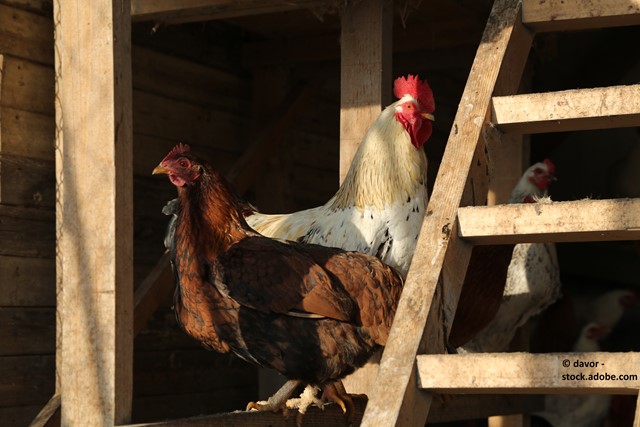Disease can be caused by living organisms (bacteria, viruses, fungi, parasites), nutritional deficiencies, toxic substances, or harsh environmental conditions. By recognizing the early warning signs of a disease, you can prevent significant mortality losses. This information is also included in our Backyard Poultry Guide.
| Disease | Symptoms | Birds Affected | What do I do? |
| Ascites (water belly) | Affected birds will be lethargic, and have labored breathing, accumulation of fluids in the body cavity and often fata | Fast growing broilers | Reduce birds growth rate by reducing day length, ensure good air quality |
| Blackhead | Contracted from chickens, wild birds &/or earthworms, decreased feed intake, watery/yellowish feces, high mortality in poults | Turkeys | Avoid problem by not allowing turkeys contact with other birds, medication is available |
| Breast Blisters | Irritations of the keel bone, blisters on the breast at the keel | Meat type birds | Provide clean, dry litter at least 4 in (10 cm) deep |
| Coccidiosis | Can be a severe problem in young birds, causes blood in feces, high mortality | Chicks | Feed medicated starter and grower feed, provide dry litter |
| Flips | Sudden death syndrome, affected chickens are often found dead on their back | Fast growing chickens | Reduce birds growth rate by reducing day length |
| Leg Problems | Lameness, limping, visible swelling at joints | Meat type birds | Reduce birds growth rate reducing day length, cull birds |
| Mites and Lice | Causes great irritation to birds; anemia due to blood loss, mites are brownish/red and the size of a pin head, lice are 0.1 in (3 mm) long and skin colored, can be seen around the vent or under wings | Chickens | Ensure the house is properly sanitized prior to birds entering, minimize contact with older birds, mite and lice controlling dusts or chemicals are available |
| Marek’s | A virus causing high mortality | Young chickens | Minimize contact with older birds, have chicks vaccinated at hatchery |
| Pasting Up | Feces stick to vent area preventing further defecation, worms or disease may be the cause if incidence is high, heat or cold stress may cause pasting up | Chicks/Poults | Pick off dried feces, minimize worm and disease threat |
| Respiratory Problems |
Gasping, wheezing, nasal discharge, and coughing, caused by virus, bacteria or fungi | All | Ensure good flock management to minimize disease threat, water medication available |
| Worms | White, round worms in feces, lowers productivity, inactive with ruffled feathers and drooping wings | All | Ensure good sanitation practices, water medication is available |
Biosecurity
Biosecurity is a term used to describe controls you have in place to limit the potential spread of disease-causing organisms to other farms or flocks. Maintaining the biosecurity of your poultry flock is an important responsibility. Government and the poultry industry have worked together to create biosecurity guides available to the poultry industry, which are updated as new information and standards are developed.
Disease symptoms to watch for include coughing, sneezing, watery eyes, droopiness, abnormal droppings and sudden drops in feed consumption or egg production. Isolate sick birds, and have your local veterinarian or poultry disease diagnostic laboratory diagnose the problem immediately to start treatment. Very sick birds should be humanely killed and buried or burned in an incinerator depending on local regulations. If allowed, disposal pits should be located at least 150 ft (46 m) from wells or springs.
To help prevent the spread of disease, do not mix birds of various ages or species. Young birds are susceptible to diseases carried by older birds. Turkeys and game birds are susceptible to some diseases carried by chickens. Disease can be controlled through cleaning and disinfection of facilities and equipment before new birds are introduced. Proper sanitation will help to prevent the spread of disease from one flock to the next.
Wet and caked litter will incubate disease. Maintaining fresh, dry litter will help to minimize the spread of disease.
Blackhead
Blackhead is a disease that turkeys contract from chickens or wild birds (occasionally chickens and quail will get it). It is rarely seen in housed flocks with no outside run. Symptoms include decreased appetite, watery and sulfur-coloured feces, and high mortality in young poults. If blackhead is a problem, providing medication for blackhead control is necessary and veterinary assistance is required. Medication is typically delivered through the water.
Cannibalism
Cannibalism may occur in young birds if they are overcrowded or have too much light or heat in the brooder. In both young and older birds, nutritional deficiencies or inadequate waterer or feeder space may also be contributing factors. With laying birds, having a ratio of too many males to females can be a factor (1:8 is a good ratio). An injury of any sort may also start cannibalism. If a bird is injured, isolate it until the wound is completely healed.
Crooked legs
Crooked legs can be a problem with meat-type birds. Leg problems are generally caused by a rapid rate of growth. The heavier the birds get, the greater the incidence. Following feed and management recommendations will help to minimize these problems. Maintaining good litter conditions, proper ventilation and avoiding overcrowding will also help.
Mites and lice
Mites and lice are a serious problem for chickens. They crawl over the chicken’s body, biting and sucking blood. Mites and lice cause great irritation to the bird, blood loss, weight loss, lowered egg production, and generally lower the birds resistance to disease. Mites can be seen by looking closely on the underside of a chicken, especially around the vent. They are brownish-red in colour and smaller than the size of a pin head.
Some mites spend the day on the perches and in crevices in the building, crawling onto the chickens at night when they go to roost. Others live continuously on the birds. If things are crawling around in the litter or nesting boxes, they are probably mites.
Lice are larger than mites. They spend their entire lives on the chicken’s body. Their eggs stick to the feathers in clumps. There are a number of treatments available for both lice and mites.
Pasting up
Chicks sometimes develop a condition called pasting up. This is when the droppings stick to the vent area. If there is a buildup of hard feces, the chick will not be able to eliminate its waste. The dried droppings must be picked off. If pasting up affects a large percentage of the chicks, worms or a disease may be the cause. Make sure that the housing is clean and the feed is appropriate for the age of bird.
Worms
Several types of worms may infest the intestinal tract of poultry. Birds with worms won’t lay well, may appear weak, have runny droppings, and will lose weight (or not gain weight rapidly if young).
Good sanitation between flocks, correct litter management and no contact with wild birds are the best controls. When a worm problem does develop the chickens are more susceptible to disease due to lowered resistance. If necessary, the birds can be treated through the water. Be sure to rule out any disease problem before treating for worms.
If you’d like to see our full poultry guide, you can download it here. For more information on raising backyard birds, read our post: Want to Raise Backyard Chickens? Here’s How to Get Started.

